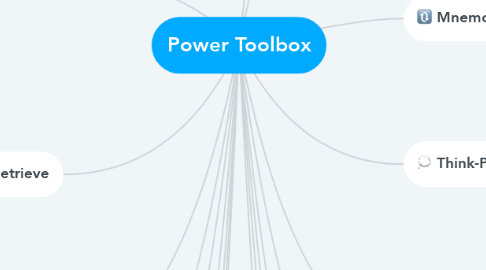Power Toolbox
by Stefanie Carotenuto

1. Power Tools
1.1. Feedback-Driven Metacognition
1.1.1. What you know vs. what don't you know & how you learn what you don't know
1.2. Spacing
1.2.1. cramming
1.2.2. spreading out retrieval over time
1.2.3. There's no perfect amount of time to space.
1.2.3.1. The day after a lesson
1.2.3.2. The week after a lesson
1.3. Interleaving
1.3.1. mixing up closely related topics
1.3.2. AAB BAC CBC
1.3.3. Higher order thinking
1.4. Retrieval Practice
1.4.1. Pulling information out of your head.
1.4.2. Retrieval > Review
2. Brain Drain
2.1. writing down everything a student remembers about a topic
2.2. Ask about past topic (spacing)
2.3. Get feedback on answer from another student (metacognition)
2.4. making a brain drain more powerful depends on the questions asked after
3. Write, Leave, Retrieve
3.1. 1. write down what they know: brain drain, 2 things, entry/exit ticket
3.2. 2. leave it and move on to the lesson
3.3. 3. retrieve the info again after
4. Two Things
4.1. Students write 2 things they remember
4.2. Great for parents to use with their student
5. Retrieval Guide
5.1. instead of a provided study guide, students generate their own based on. prompts from the teacher. They retrieve instead of look up.
6. Weekly Quizzes
6.1. focused on retrieval and spacing
6.2. daily topics all combined for the week
6.3. no or low-stakes
6.4. Big Basket Quizzes "BBQ" even more spaced retrieval
7. The Dice Game
7.1. 1. Students are in small groups or pairs
7.2. 2. Students get a numbered list of similar vocabulary words or related concepts
7.3. 3. One student rolls
7.4. 4. The student who rolls then retrieves the number they roll
7.5. 5. The other student(s) provide feedback
7.6. 6. Switch turns
8. Lightening Round
8.1. 1. create list of past & current topics (or students create the list)
8.2. 2. Have one student call out concepts from the list at random
8.3. 3. Have all students retrieve and write down their answers
8.4. 4. Give students feedback at the end of the lightening round to keep it fast paced
9. Metacognition Sheet
9.1. Graphic organizer with * & ? then topic/concept/person to know & space for answer
9.2. contains entire chapter of info
9.3. retrieval for key terms, definitions, essential questions, complex ideas
10. Breathe and Retrieve
10.1. Next to quiz questions, students circle Nailed it! or Not Sure!
10.2. Forces students to make a judgement of learning
10.3. should be used only on multiple choice
10.4. always use even numbered confidence ratings
11. Power Ticket
11.1. 1. Student gets blank copy
11.2. 2. Teacher provides topics based on essential questions: Today, Yesterday, Last week, Last month, Last quarter, Last semester.
11.3. 3. Students individually write one fact about each topic. 5 mins. Can choose where they begin.
11.4. 4. Students share their Power Tickets and add to other peers, write a second & third fact about each topic.
11.5. 5. Share as a whole class and add more.
11.6. Power Tools: Retrieval, Spacing, Interleaving (depending on the questions, topics should be similar), Metacognition (students get immediate feedback).
12. Mnemonics
12.1. a device such as a pattern of letters, ideas, or associations that assist in remembering something.
13. Think-Pair-Share - Think Again
13.1. 1. Write an answer (interleaved)
13.2. 2. give paper to another student. they can add 2 things.
13.3. 3. evaluate: did you write down any misinformation? why do you think. you remembered what you. did?
14. Retireve-Taking
14.1. Instead of taking notes during a lecture, provide time to write during & after. This lets students process.
15. Mini-Quizzes
15.1. no grade, low-stakes, basket of clues
15.2. focused on every day retrieval about day's topic
16. Pre-Tests
16.1. Engages student metacognition
16.2. teacher can evaluate student background knowledge to drive content
17. Fishbowl
17.1. 1. write past and current topics on slips of paper in a bowl
17.2. 2. A student draws a slip followed by write-pair-share
18. Retrieval Cards
18.1. provide boxes with a definition
18.2. students first write a * or ?
18.3. then students write the word for the definition
18.4. contain content from week-long lesson
18.5. retrieval for key terms
19. Metacognition Line-Up
19.1. 1. students gather on one side of the room & a key term, word, concept is announced.
19.2. 2. student move along a spectrum. "Confidently Retrieved It", "Kind of Retrieved it", "Not sure".
19.3. 3. students match with the person closest to them & talk for 2 minutes about what. they know or don't know with their partner
19.4. 4. next, students match with someone far away to discuss, share, teach for 2 mintues
19.5. 5. students who originally couldn't retrieve share what they learned with the class


